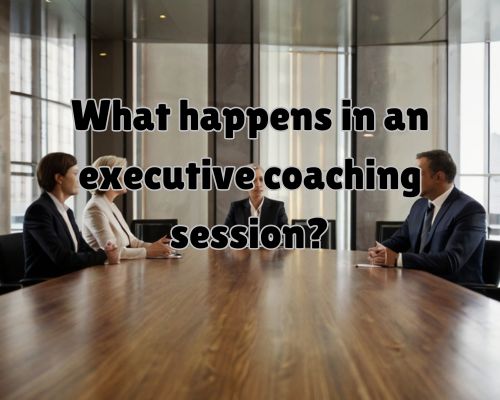
What Happens in an Executive Coaching Session? Key Insights and Expectations
What Happens in an Executive Coaching Session? Key Insights and Expectations
Stepping into an executive coaching session can be a transformative experience. These sessions are primarily focused on enhancing your leadership and professional development.
Whether you’re a seasoned executive or an emerging leader, these sessions are designed to refine your skills. They also aim to align your actions with your goals and increase your business impact.
Through a combination of assessment, goal-setting, and personalized guidance, you can gain the insights needed to elevate your effectiveness as a leader.

During a typical session, you work closely with a skilled coach to explore your strengths and address areas for growth. This collaborative partnership helps you identify underlying beliefs or patterns that might be hindering your progress.
With the coach’s support, you set actionable goals and develop strategies to navigate challenges within your business environment effectively.
You’ll find that executive coaching isn’t just about addressing immediate concerns. It’s also about fostering long-term personal and professional growth.
Based on Make It Happen Coaching, sessions range from 60 to 90 minutes, ensuring there’s ample time for in-depth conversations and reflective thinking without overstressing. The result is a more self-aware, adaptable, and impactful leader, ready to take on the dynamic challenges of today’s business world.
The Coaching Framework and Process
In executive coaching, a structured framework guides participants through building a productive coaching relationship, assessing strengths and weaknesses, and developing actionable plans to achieve leadership goals. This process relies on trust, confidentiality, and accountability to foster meaningful growth.
Establishing the Coaching Relationship
Building a strong coaching relationship is essential. Your coach facilitates trust and rapport, ensuring that you feel comfortable sharing insights and challenges.
Confidentiality is a cornerstone, allowing open communication. This relationship sets the stage for effective collaboration, providing a supportive environment where you can explore leadership challenges openly.
Establishing clear boundaries and expectations is critical here, laying the groundwork for a productive coaching journey.
Assessment and Goal Setting
Assessment involves evaluating your strengths, weaknesses, and blind spots. Tools such as 360-degree feedback offer comprehensive insights into how others perceive your leadership style.
This phase enhances self-awareness, helping you identify areas for growth.
Setting specific, measurable goals is key, as these provide direction and focus throughout the coaching process. Aligning these goals with your organizational objectives ensures relevance and impact.
Developing Action Plans
Action plans translate insights into concrete steps. Your coach collaborates with you to design a strategy that addresses your goals and challenges.
This involves identifying solutions and creating a timeline with clear action steps. Regular feedback loops foster accountability, making sure you stay on track.
Commitments to these plans reinforce your growth and development, turning aspirations into achievements within a structured framework.
Outcomes and Advancements
Effective executive coaching sessions especially with Make It Happen Coaching, drive substantial enhancement in leadership skills and professional growth. This involves fostering skill development and thorough evaluation of progress to identify next steps for improvement.
Fostering Professional Growth
In executive coaching, the primary focus is on cultivating leadership abilities and enhancing professional development.
You will engage in targeted activities that bolster performance and nurture personal growth.
The coaching process provides an environment where you can safely explore leadership styles and identify areas for improvement.
Moreover, executive coaching can increase employee engagement by empowering you to foster more effective team dynamics and workplace communication.
Skills gained in these sessions enable leaders to create a supportive work culture, reinforcing organizational values and boosting overall productivity.
Through active participation, you’ll emerge as a more adaptable and insightful leader in your professional landscape.
Evaluating Progress and Next Steps
Continuous evaluation is a vital component in tracking your development throughout the executive coaching journey.
Regular assessments help you monitor progress towards goal attainment and pinpoint specific areas for improvement.
This evaluation may involve quantitative metrics, feedback from peers, or personal reflection to ensure a comprehensive view of your advancement.
Follow-up sessions with your coach often serve as a platform to discuss achievements and recalibrate objectives.
Discussing your experiences and outcomes facilitates new insights, encouraging a strategic approach to further skill development.
By focusing on these aspects, you can make informed decisions about your next steps, ensuring enduring growth and increased effectiveness in your leadership role.